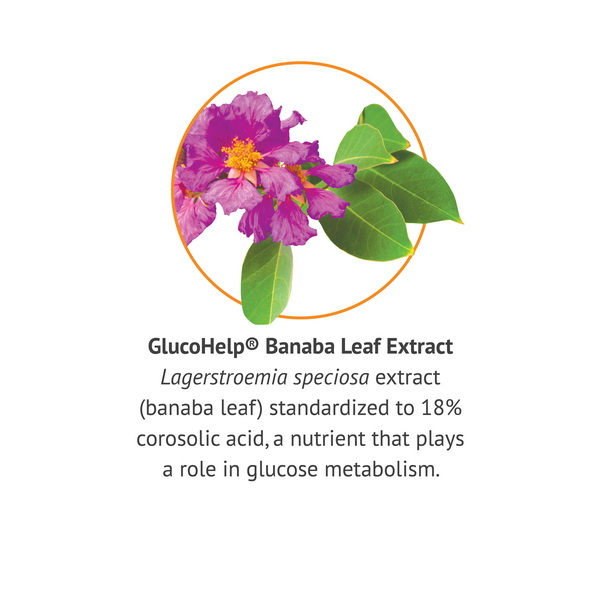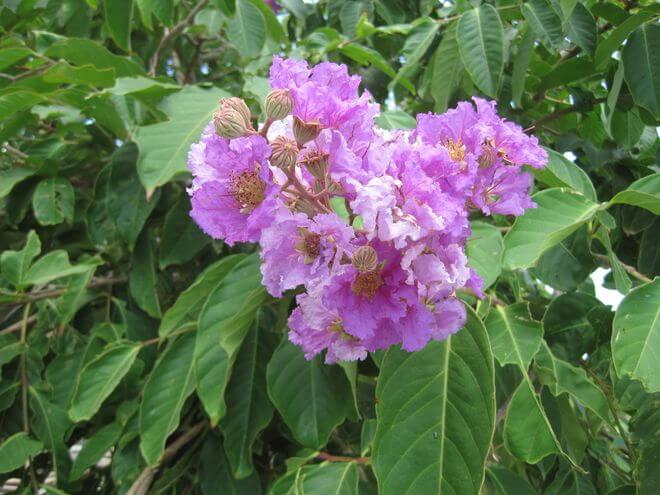Content Menu
● Introduction to Lagerstroemia Speciosa
>> Key Components of Banaba Leaf Extract
● Metabolic Benefits of Banaba Leaf Extract
>> Anti-Diabetic Effects
>>> Mechanism of Action
>> Anti-Obesity Effects
>>> Adipogenesis Inhibition
>>> Lipolysis Promotion
>> Energy Enhancement
>>> Role in Athletic Performance
● Synergistic Effects with Other Compounds
>> Combination with Lactobacillus Mixture
>> Combination with Insulin
● Safety and Toxicity
● Traditional Uses of Banaba Leaf Extract
● Modern Research on Banaba Leaf Extract
● Conclusion
● Frequently Asked Questions
>> 1. What are the primary bioactive compounds in Banaba leaf extract?
>> 2. How does Banaba leaf extract affect blood glucose levels?
>> 3. Can Banaba leaf extract be used for weight management?
>> 4. Is Banaba leaf extract safe for consumption?
>> 5. Can Banaba leaf extract enhance energy levels?
● Citations:
Lagerstroemia speciosa, commonly known as Banaba, is a tropical plant native to Southeast Asia. Its leaves have been used in traditional medicine for centuries, particularly for treating diabetes and obesity. Recent studies have highlighted the potential of Banaba leaf extract in improving metabolism and energy levels. This article explores the scientific evidence supporting these claims and discusses how Lagerstroemia speciosa leaf extract might contribute to enhanced metabolic health.

Introduction to Lagerstroemia Speciosa
Lagerstroemia speciosa is a deciduous tree belonging to the Lythraceae family. It is widely recognized for its medicinal properties, including anti-diabetic, anti-obesity, and antioxidant activities. The plant's leaves contain several bioactive compounds, such as corosolic acid, ellagitannins, and triterpenes, which are believed to be responsible for its health benefits.
Key Components of Banaba Leaf Extract
- Corosolic Acid: Known for its hypoglycemic effects, corosolic acid can decrease blood sugar levels within 60 minutes in human subjects. It also exhibits antihyperlipidemic and antioxidant activities.
- Ellagitannins: These compounds enhance glucose uptake in adipocytes and may contribute to the regulation of lipid metabolism.
- Triterpenes: Include oleanolic acid and asiatic acid, which have been shown to improve insulin sensitivity and glucose metabolism.
Metabolic Benefits of Banaba Leaf Extract
Banaba leaf extract has been studied extensively for its metabolic benefits, particularly in managing diabetes and obesity.
Anti-Diabetic Effects
Banaba leaf extract has been used to treat diabetes due to its ability to lower blood glucose levels. Corosolic acid, a key component, enhances cellular glucose uptake and inhibits gluconeogenesis, thereby reducing blood sugar levels.
Mechanism of Action
The hypoglycemic effects of Banaba are mediated through several mechanisms:
- Enhanced Glucose Uptake: Corosolic acid increases glucose uptake in cells by stimulating the activity of glucokinase.
- Impaired Hydrolysis of Carbohydrates: It inhibits the breakdown of sucrose and starches, reducing glucose release into the bloodstream.
- Decreased Gluconeogenesis: By inhibiting the production of glucose in the liver, Banaba extract helps maintain lower blood glucose levels.
Anti-Obesity Effects
Banaba leaf extract has been shown to reduce body weight and fat accumulation in animal studies. It inhibits adipogenesis (the formation of new fat cells) and lipogenesis (the production of fat), while promoting lipolysis (the breakdown of fat).
Adipogenesis Inhibition
Studies have demonstrated that bioactive fractions from Banaba leaves can inhibit the differentiation of preadipocytes into mature adipocytes, thereby reducing fat tissue expansion. This effect is crucial in preventing obesity-related complications.
Lipolysis Promotion
Banaba leaf extract promotes lipolysis by activating hormone-sensitive lipase (HSL), an enzyme that plays a significant role in breaking down stored fats into free fatty acids. This process not only aids in weight management but also provides a source of energy during periods of caloric deficit.
Energy Enhancement
While direct evidence linking Banaba leaf extract to increased energy levels is limited, its metabolic benefits could indirectly enhance energy by improving insulin sensitivity and glucose metabolism. Efficient glucose utilization can lead to better energy production in cells.
Role in Athletic Performance
Some studies suggest that the metabolic enhancements provided by Banaba leaf extract may benefit athletes or individuals engaging in regular physical activity. Improved glucose uptake can lead to increased endurance during exercise sessions by ensuring that muscle cells receive adequate energy.

Synergistic Effects with Other Compounds
Combining Banaba leaf extract with other compounds can enhance its metabolic benefits.
Combination with Lactobacillus Mixture
A study found that a combination of Banaba leaf extract and a Lactobacillus mixture inhibited weight gain and fat tissue expansion in mice more effectively than either component alone. This synergy suggests that gut health plays a significant role in metabolic processes.
Combination with Insulin
Banaba leaf extract has been shown to synergistically enhance the activity of insulin when used together, suggesting potential benefits for managing diabetes. This combination could be particularly useful for individuals with insulin resistance or type 2 diabetes.
Safety and Toxicity
Banaba leaf extract is generally considered safe with no reported adverse effects in animal studies or human clinical trials. Acute toxicity studies have confirmed its safety even at high doses. However, it is essential for individuals considering supplementation to consult healthcare professionals, especially those on medication for diabetes or other metabolic disorders.
Traditional Uses of Banaba Leaf Extract
In traditional medicine systems across Southeast Asia, Banaba leaves have been utilized not only for their anti-diabetic properties but also for various other ailments:
- Anti-inflammatory Properties: The leaves are believed to reduce inflammation, making them useful in treating conditions like arthritis.
- Antioxidant Effects: The antioxidant properties help combat oxidative stress, which is linked to various chronic diseases.
- Digestive Health: Traditionally used as a remedy for digestive issues, Banaba may support gut health due to its fiber content and potential prebiotic effects.
Modern Research on Banaba Leaf Extract
Recent scientific studies have begun validating the traditional uses of Banaba leaf extract through rigorous research methodologies:
1. Clinical Trials: Randomized controlled trials have demonstrated significant reductions in fasting blood glucose levels among participants taking Banaba leaf extract compared to placebo groups.
2. Animal Studies: Research involving animal models has shown that Banaba can effectively reduce body weight and improve lipid profiles.
3. In Vitro Studies: Laboratory studies have confirmed the ability of corosolic acid to stimulate glucose uptake in muscle cells.
These findings highlight the potential applications of Lagerstroemia speciosa leaf extract as a natural supplement for metabolic health.
Conclusion
Lagerstroemia speciosa leaf extract, commonly known as Banaba, offers promising metabolic benefits, particularly in managing diabetes and obesity. Its bioactive compounds, such as corosolic acid and ellagitannins, contribute to improved glucose metabolism and fat regulation. While more research is needed to fully understand its effects on energy levels, the extract's ability to enhance metabolic health could indirectly support increased energy production. As interest grows in natural remedies for metabolic disorders, Banaba leaf extract stands out as a valuable candidate deserving further exploration.

Frequently Asked Questions
1. What are the primary bioactive compounds in Banaba leaf extract?
The primary bioactive compounds in Banaba leaf extract include corosolic acid, ellagitannins, and triterpenes like oleanolic acid and asiatic acid. These compounds are responsible for its anti-diabetic and anti-obesity effects.
2. How does Banaba leaf extract affect blood glucose levels?
Banaba leaf extract, particularly corosolic acid, enhances cellular glucose uptake, impairs carbohydrate hydrolysis, and decreases gluconeogenesis, thereby lowering blood glucose levels.
3. Can Banaba leaf extract be used for weight management?
Yes, Banaba leaf extract has been shown to inhibit adipogenesis and lipogenesis while promoting lipolysis, which can help in reducing body weight and fat accumulation.
4. Is Banaba leaf extract safe for consumption?
Banaba leaf extract is generally considered safe with no reported adverse effects in animal studies or human clinical trials. However, it should be consumed under the guidance of a healthcare professional.
5. Can Banaba leaf extract enhance energy levels?
While there is limited direct evidence linking Banaba leaf extract to increased energy, its metabolic benefits could indirectly enhance energy by improving insulin sensitivity and glucose metabolism.
Citations:
[1] https://www.mdpi.com/2079-7737/13/12/1047
[2] https://pubmed.ncbi.nlm.nih.gov/22095937/
[3] https://pmc.ncbi.nlm.nih.gov/articles/PMC11434581/
[4] https://pmc.ncbi.nlm.nih.gov/articles/PMC3468018/
[5] https://www.healthline.com/nutrition/banaba-leaf
[6] https://pmc.ncbi.nlm.nih.gov/articles/PMC10837052/
[7] https://www.dovepress.com/bioactive-fraction-from-lagerstroemia-speciosa-leaves-dlbs3733-reduces-peer-reviewed-fulltext-article-JEP
[8] https://www.pchrd.dost.gov.ph/heartnovation/banaba-tablets-standardized-herbal-supplement-with-blood-sugar-lowering-health-benefits/
[9] https://onlinelibrary.wiley.com/doi/full/10.1002/fft2.327
[10] https://pubmed.ncbi.nlm.nih.gov/10737232/
[11] https://magistralbr.caldic.com/storage/product-files/1201045165.pdf






























